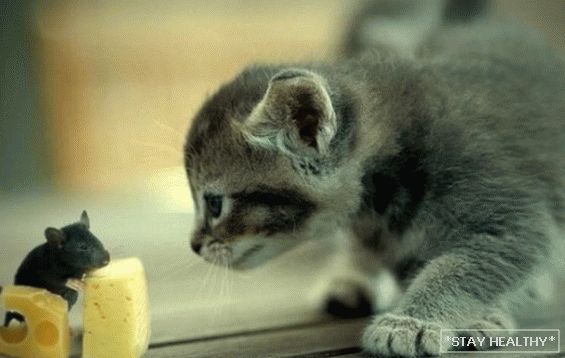 Вт, 12 дек 2017 Автор: Алекс Красилин
Вт, 12 дек 2017 Автор: Алекс Красилин
Balanced nutrition – the guarantee of health and full
development kittens. Digestive organs are just starting to develop,
therefore, attention should be paid to the proper transition to an adult
feed. Dairy products, including cheese, help to solve
many important questions of intensive pet growth.
Contents
The health benefits of cheese for kittens
Cheese is a fermented milk product rich in vitamin and minerals,
well digested by the digestive system, and is beneficial for
intensely growing body of a kitten. Fermented milk product
contains the full-fledged protein necessary for development of muscle bulk
“predator in miniature”. Milk fat is not only a source
energy for the mobile kittens, but also saves fat soluble
vitamins, and also improves the condition of the coat.
Calcium, which is rich in any kind of cheese, is responsible for the formation
strong bones and rolling spine, healthy teeth and sharp
claws. From cheese an important macro element is absorbed worse than from
cottage cheese. Whether to give kittens to feed the cheese or you can restrict
cottage cheese? In comparison with cottage cheese or chicken eggs, cheese is more
balanced in minerals and vitamins, which compensates for reduced
calcium absorption.
In the first weeks of life, the immunity of furry babies is maintained.
protective properties of colostrum. Turning to adult nutrition,
care should be taken to intake animal vitamin and
minerals. Regular feeding with cheese will provide kittens with vitamins.
C, A, E and choline, which will support the development of their own
immunity. Phosphorus, potassium and other minerals will ensure normal
development of organs and the nervous system of a pet.
How to check a kitten for lactose tolerance
The kittens like milk and cheese, but can they be included in
lure? In the first months of life, feeding kittens with milk and
fermented milk products does not create any serious problems.
As you grow older, there are difficulties with the assimilation of lactose that
causes indigestion or diarrhea. Therefore, in
The diet of adult cats is left only sour-milk.
products containing less milk sugar.
Complete lactose intolerance in cats is rare.
Therefore, problems with feeding kittens with cheese arise in the case of
insufficient amount of enzymes necessary for absorption
milk sugar. So that after eating a delicacy eaten at home
pet did not have difficulties with digestion, and he did not hold
time in the toilet tray, it is necessary to make sure in advance that there is no
lactose intolerance.
To check it is enough to feed the kitten with a small amount
cheese, and look at the response of the body. If he doesn’t
shows signs of discomfort and visits the toilet tray no more
usually, his digestive system successfully copes with
lactose. Only in this case it is possible to include cheese in the diet of complementary foods.
and other dairy products.
When you can use cheese for feeding kittens
In the second month of life, baleen babies begin to gradually
to accustom to adult food. In this regard, veterinarians are often asked
question: “Is it possible for small kittens to give cheese?”. In addition to meat or
fish pets in the form of complementary foods should receive fermented milk
products, at the rate of 20-60 gr. per kilogram of its own weight.
Soft cheeses are allowed to be added to the feed from the first
complementary foods, but not more often than twice a week and in limited
quantity.
When the kittens will be a month and a half, in the diet of prikorma need
add hard cheeses. A piece of delicacy should be rubbed.
on a coarse grater so as not to have difficulties feeding time.
Starting from 4 months of life, you can feed dairy products with
low fat:
sour cream;
cottage cheese;
kefir;
yogurt;
yogurt;
non-fat cheeses.
Cheese cannot serve as a main source of nutrition for kittens, even
if the digestive system copes well with it. Stomach
A growing pet is sensitive to a lot of fat. Excess
cheese in the diet causes diarrhea or constipation. To
avoid severe digestive disorders should
add to the food kittens cheeses Suluguni, Edam or other low-fat
varieties.
To increase shelf life and enhance taste in
Cheese is added a significant amount of salt. Excess
sodium intake in the body leads to imbalance,
which is fraught with harmful consequences for the health of a pet.
Adding cheese to a kitten’s diet should be given away.
preference Adygei or Swiss cheese. Worth less
feed with cheese or cheese, which, despite the soft
consistency, rich in salt content.
To impart taste to the cheese manufacturing techniques provides
adding spices and herbs. Among the seasonings most
Popular onions and garlic. Getting into the body
little kitty, these plants are able to provoke death
red blood cells that pose a threat to healthy development.
In addition, popular seasonings are extremely toxic. Developing
the digestive organs of the kittens are very gentle, so you need to follow
ensuring that the cheese is not expired or of low quality.
Adding to the food cheap variety of cheese, you can harm the kittens.
Almost all low priced cheeses contain different
preservatives and stabilizers, as well as dyes. All these supplements
cause serious harm to the intestines and the liver of kittens, in addition
chemicals form carcinogens and heavy metals.
Using cheese as a complementary food, you should make sure that the delicacy is
will be clean from various additives and will not cause illness
beloved pet.
Despite all the good qualities of cheese, its share in feeding
kittens should be minimal. Giving a pet a serving of cheese
as a treat or as a reward for training, it is necessary
observe the measure so as not to harm the health of the kitten.






